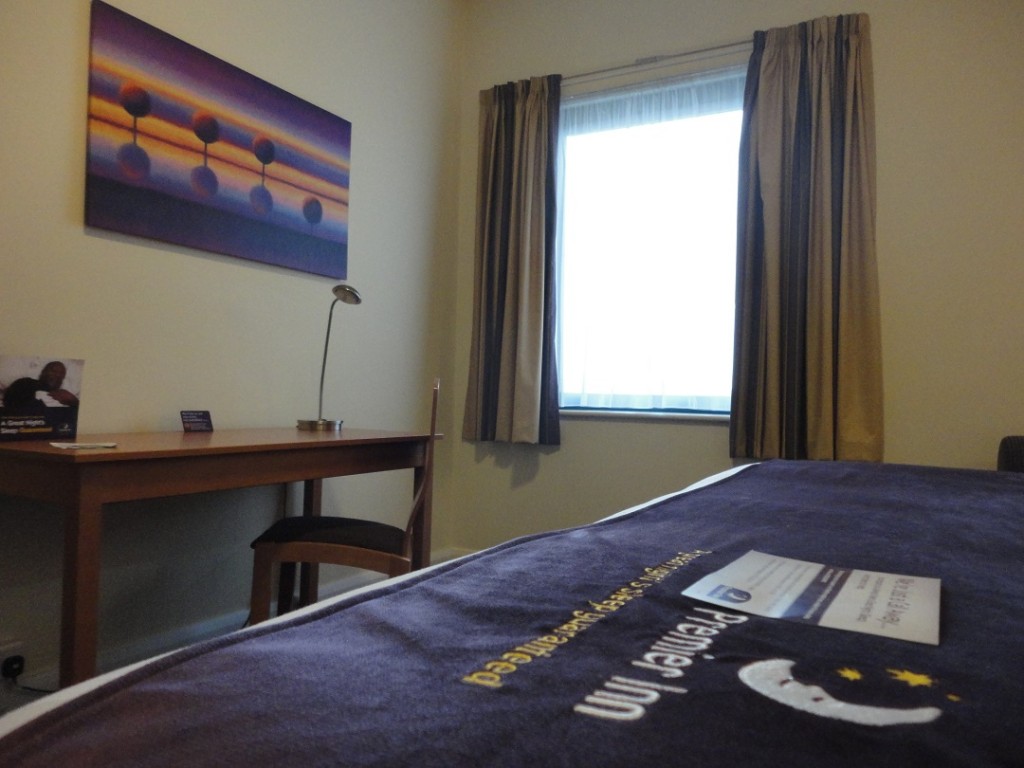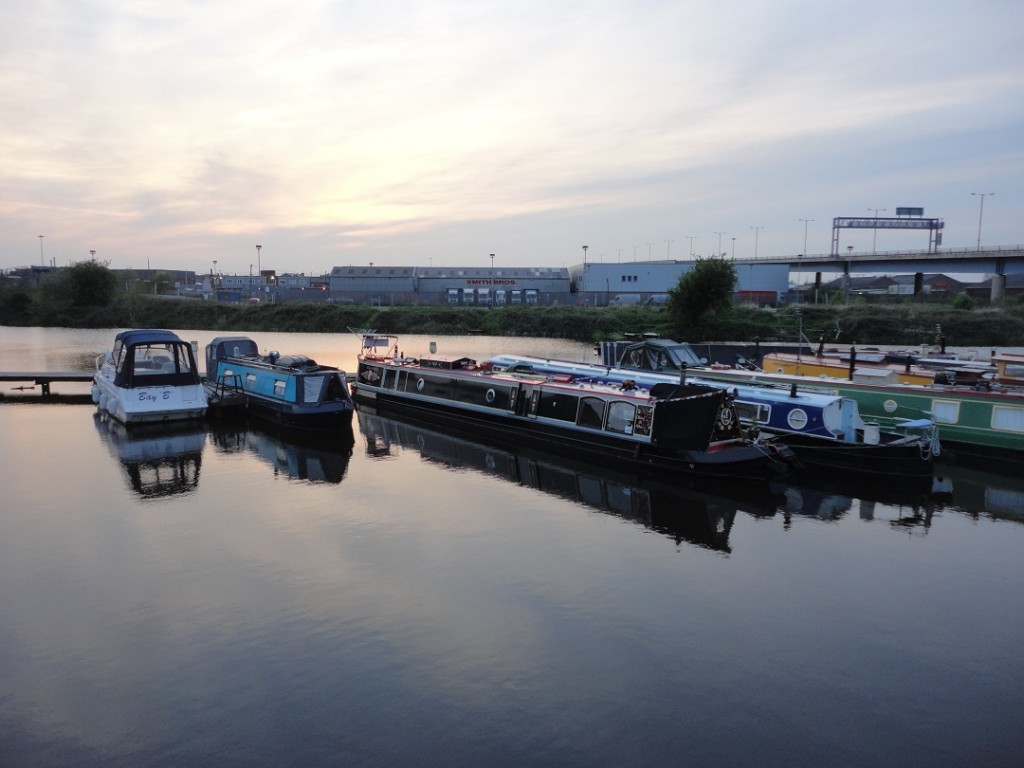The practices of a national budget hotel chain tell you a lot about a country; in Britain’s case, its need to have constant access to cups of tea and, in the morning, a large cooked breakfast.
Originally published on Beacon.
This could be Doncaster, or anywhere, Liverpool or Frome. The hotel room looks a lot like 55,000 others. It is painted cream, with the carpet and a sofa bed in purple dotted with mauve. The furnishings are fairly minimal – no minibar, no luxury toiletries, no phone. Just a flowery cushion (in cream, pink and mauve), a TV (free-to-view channels), an abstract print (see below, lots of purple) and liquid soap dispensers. Oh, and a kettle, tea, coffee and some UHT milk, obviously. The only hotels in Britain that don’t provide a kettle are those so high-end they assume you’ll order your beverages from room service.
This room could be in hundreds of places in Britain, but is in fact in Doncaster in south Yorkshire. The opening line of this article was nearly sung by the Beautiful South, a band from just down the road in Hull, but with a slightly broader range of locations concerning the anomie of international travel. This series likes to celebrate the infinite variety of Britain: it could discuss Doncaster’s ancient and rebuilt minster church, the fish gleaming on ice on stalls in the market, or the St Leger, the city’s horse race as old as America.
But instead of John Singleton winning the St Leger on Allabaculia in the year 1776, this article is about the High Fishergate Premier Inn, room 326. It can be argued that this big, standardised budget hotel chain is part of the creeping homogenisation of Britain’s quirks. Well, perhaps, but Premier Inns possess some British quirks of their own.

It should be said that predictability in hotel chains is not a bad thing, if that means they reliably provide a clean, comfortable and safe place to sleep. Premier Inns offer a refund if you don’t get a good night’s sleep, and build rooms that mean you aren’t likely to be asking for that refund, with comfy beds, reliable bathrooms and thick curtains.
But with those curtains closed, you could be anywhere in Britain. (Except when a distinctive church bell strikes the hour, probably in the minster, just the other side of the dual carriageway.) Premier Inn is relatively cheap – this room cost £46 ($78) for the night – through economies of scale and cutting out what it believes hotel guests no longer want… such as the use of colours other than cream and purple. The colour scheme is everywhere: those curtains, the shower curtains too, pretty much everything in reception, the staff shirts. The receptionist has purple-dyed hair; although not for branding purposes, but because she likes purple. She works in the right place.
However, as a national chain which sends its mainly-British customers a lot of surveys, Premier Inn does tell you something about they really want. Big international hotels tend to be alike the world over so they work for everyone, but national chains can focus. Australian hotels outside big cities often have kitchenettes with fridges. American motels have acres of parking. British ones have kettles, good strong tea and bad freeze-dried coffee.
Luckily, Whitbread, the British conglomerate that runs Premier Inn, also runs Costa, the country’s biggest chain of coffee shops. Costa is the British version of Starbucks – and is beating the US chain at its own game here, with 1,755 branches in Britain – but like its rival it can be accused of homogenising high streets. Costas serve pretty good coffee, but as cafés they can be seen as fairly bland, and certainly each branch is much like another. It should be said that many people either disagree or like it that way: Whitbread’s financial results this week reported Costa’s UK sales rising by 6.9%, with 400m drinks helping push profits up 22% to £110m. Apparently, the chain is even succeeding in Paris, with four cafés open and five more planned this year.
Meanwhile, Premier Inn is thriving too, with profits up 13% this year, and it plans to add another 20,000 rooms to the 55,000 British rooms it already has. It too is clearly succeeding, and while a good night’s sleep must be part of that success, the best is yet to come: breakfast.
There is presumably a hidden clause in the Magna Carta which states that, when staying in any kind of accommodation, Britons must have access to a full cooked breakfast. A whole class of small guesthouses, B&Bs, are named after the fact that they provide you with a Bed then serve Breakfast in the morning. In England, the full-fat version of this meal will be called a full English; in the UK’s other nations much the same thing may be named after the nation in question. (There may be subtle differences; in Scotland, the meat products are likely to be more outré than in England. Anyone for lorne? Actually, yes please.)
The only problem with this is, it’s not terribly healthy, eating sausages, bacon and eggs of a morning. At home, most Britons eat cereal, fruit, yoghurt or toast. Premier Inn helps you with this conundrum by offering as much as you can eat of all of the above for £8.75. This means you can kid yourself that you are taking the healthy option of fruit salad, plus a coffee (Costa, obviously) and a little croissant. Then follow up with the full English. Then take away another coffee in a paper cup.
This is also fun because, usually, you are having your breakfast in a room that doubles as a pub or a restaurant. Whitbread was originally a brewer and pub chain, and Premier Inns always include some kind of pub/restaurant, serving lunch, dinner and breakfast. Some Premier Inns have been built on part of the car-park of one of those pubs, although Whitbread is quite capable of faking a heritage when it wants to: the apparently centuries-old Liskeard Tavern by the A38 dual carriageway running past that Cornish town was built at the same time as the obviously-new Premier Inn next to it.
The Doncaster Barley Twist pub/restaurant serves the same food as the other Table Table-branded restaurants across Whitbread’s estate, including the Liskeard Tavern. It’s not sophisticated, but like the hotel room, it is reliable and does the job.
And in a city like Doncaster, which its best friends would concede has seen better days, the Premier Inn building – a modern, shiny block, which also includes a gym and a posh delicatessen – looks like an asset. Much of the city centre looks run-down, and while in many cities an urban waterfront attracts nice bars, restaurants and cafés, in Donny it means a few canal boats and the St George’s flyover.

There’s a final ingredient to Premier Inns and their associated restaurants: the staff. Generally young and unpretentious, they treat you as if they were cheerfully checking your shopping through the supermarket till – efficiently but with good humour. It beats the type of waiter and receptionist who act as if serving is an affront to their dignity, along with those who call you guys in a posh voice and tell you how much they love today’s special. Quite possibly, serving tables at a Whitbread chain beats the same job at many standalone restaurants; big companies tend to offer training and a career path.
There are better hotels, but there are also far worse. Travelodge, Premier Inn’s rival budget chain, is nothing like as consistent: one London branch, apparently a converted office block, features small bathrooms with huge, if moderately opaque, windows right by the in-bath showers, which must be entertaining for locals. And breakfast at the Hilton next to Earl’s Court during a big conference is a once-in-a-lifetime experience – I hope.
Sometimes in an unfamiliar part of Britain, what you want is friendly staff, a comfortable room with tea and a kettle and an all-you-can-eat breakfast. A Premier Inn may make each city and town it opens in a bit less unusual, but it also helps make them a bit more accessible to those who don’t know the place, as there is no need for local knowledge of which hotels are good and which are terrible. And it certainly doesn’t make its host locations any less British.
Possibly contrary to appearances, this article is not an example of native advertising; I just quite like Premier Inns.
